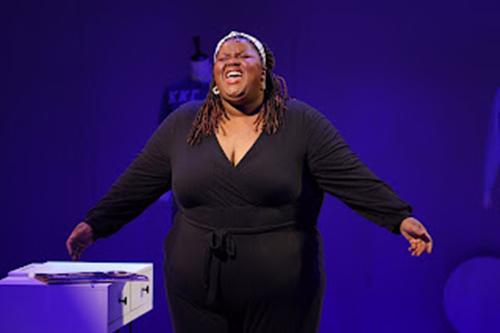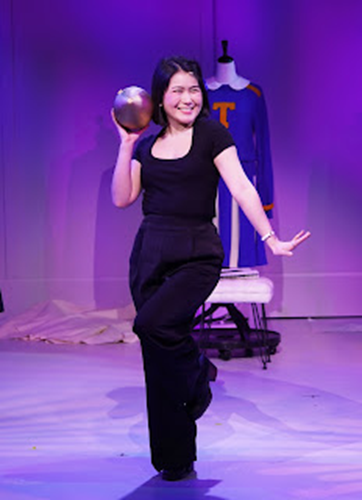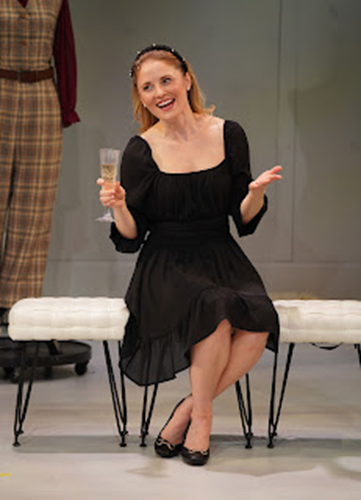The York Theatre Company's production of Vanities, running through April 22, has many strong points. The main strength is the cast.
The story of three friends from roughly age 18 (in 1963) to roughly age 45 (in 1990), Vanities features terrific performances by Jade Jones, Amy Keum, and Hayley Podschun. They have good chemistry and provide full, textured characters. Most importantly, they all have truly beautiful voices.
 |
| Jade Jones Photo: Carol Rosegg |
The direction by Will Pomerantz, music direction by Deborah Abramson, and choreography by Shannon Lewis are also effective. The scenic design by James Morgan is elegant in its simplicity. The costume design by Barbara Erin Delo succeeds for two of the performers (but does no favors for the third). The band is small in number but not in sound: Deborah Abramson, conductor and keyboards; Jessie Linden, drums/percussion; Jim Donica, electric and acoustic bass; Matt SanGiovanni, electric and acoustic guitar and banjo; and Greg Thymius, flute, clarinet, and soprano, alto, and tenor sax.
 |
| Amy Keum Photo: Carol Rosegg |
I was unimpressed by the show itself, unfortunately. First, I must specify that I believe that anyone should be allowed to write about anyone, across gender, race, and age. For example, Ibsen, John Sayles, and James Baldwin have all written believable compelling women characters.
 |
| Hayley Podschun Photo: Carol Rosegg |
However, Vanities clearly was written by people who have never been--and don't understand--women. Throughout the show, the writers (book, Jack Heifner; music and lyrics, David Kirshenbaum) make mistake after mistake.
First, while the writers clearly want to depict real women in Vanities, they seem to believe that shallow depictions of cheerleaders from the past reflected actual human cheerleaders. As a result, the characters are thinly written, and their discussions are too often cutesy. When, for example, the women talk in 1963 about whether or not to have sex, the topics of birth control (not legal for single women in 1963) and abortion (not legal for anyone) are not mentioned. Potential pregnancy was not a joke in the early 1960s, and only cartoon cheerleaders wouldn't be concerned.
Throughout the show, there is way too much dialogue that relies on cheap, non-character-driven humor and makes the women look like idiots. For example,INTERCOM: Students, I am sad to announce the President has been shot.
JOANNE: The president of the student council has been shot?
KATHY And MARY: Oh my God.
INTERCOM: The President was gunned down in Dallas.
JOANNE: Dallas? I just saw him in algebra.
INTERCOM: If this report is true, classes will be dismissed for the rest of the day.
KATHY: What about the pep rally?
INTERCOM: In any case, the football game will take place as planned this evening.
ALL: Oh–THANK GOD.
For old-fashioned musical comedy characters, I guess this is okay. But for real women, which, again, seems to be the
show's goal, it's unrealistic and insulting.
In another example, one of the characters says, "When I found out that George Eliot was a woman, I got all confused." Really?
Also, the show focuses way too much on men. Yes, many women are very concerned, even obsessed, about men, particularly in their late teens and 20s. But that's not all they're concerned about.
[Spoiler] The show is ostensibly about the women's friendships, but only on the most surface level. In fact, the biggest plot point is when one woman sleeps with the other's husband. Why? Because the writers couldn't imagine anything else for female friends to fight about! Also, it's highly unlikely that the cheated-on woman would ever forgive her friend, but it's particularly unlikely that she would forgive her so easily. [End of spoiler]
One last point: I am a big fan of inclusive casting, but when much of the show is about appearances, it can be awkward. Particularly when they are young, the characters in Vanities judge other people, harshly, by their looks. The show is called Vanities, after all. Having one of these characters be a large Black woman denies the reality (such as it is) of the show. If the other two women were capable of being best friends with a large Black woman--in 1963 in Texas!--they wouldn't be who the show claims they are.
On the other hand, Jade
Jones is a wonderful performer, and I imagine it's not a coincidence that there were many more people of color in the audience than usual, which is great. And I'm certainly glad to have seen Jones. I can't wait until there are enough good juicy roles to go around for people of every type and background.
Wendy Caster





